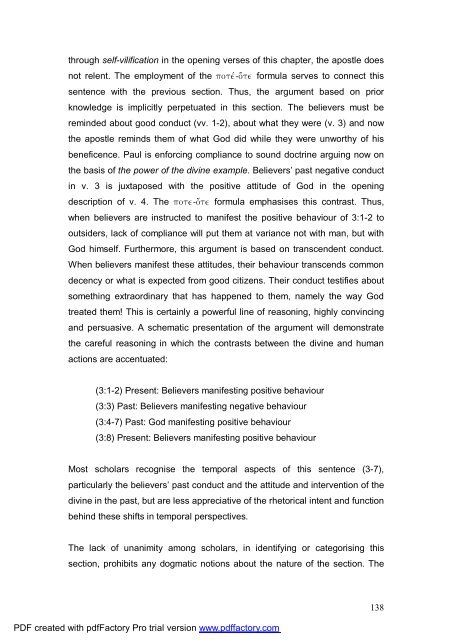A Text centred rhetorical analysis of Paul's Letter to Titus
A Text centred rhetorical analysis of Paul's Letter to Titus
A Text centred rhetorical analysis of Paul's Letter to Titus
You also want an ePaper? Increase the reach of your titles
YUMPU automatically turns print PDFs into web optimized ePapers that Google loves.
through self-vilification in the opening verses <strong>of</strong> this chapter, the apostle does<br />
not relent. The employment <strong>of</strong> the potev-o{te formula serves <strong>to</strong> connect this<br />
sentence with the previous section. Thus, the argument based on prior<br />
knowledge is implicitly perpetuated in this section. The believers must be<br />
reminded about good conduct (vv. 1-2), about what they were (v. 3) and now<br />
the apostle reminds them <strong>of</strong> what God did while they were unworthy <strong>of</strong> his<br />
beneficence. Paul is enforcing compliance <strong>to</strong> sound doctrine arguing now on<br />
the basis <strong>of</strong> the power <strong>of</strong> the divine example. Believers’ past negative conduct<br />
in v. 3 is juxtaposed with the positive attitude <strong>of</strong> God in the opening<br />
description <strong>of</strong> v. 4. The pote-o{te formula emphasises this contrast. Thus,<br />
when believers are instructed <strong>to</strong> manifest the positive behaviour <strong>of</strong> 3:1-2 <strong>to</strong><br />
outsiders, lack <strong>of</strong> compliance will put them at variance not with man, but with<br />
God himself. Furthermore, this argument is based on transcendent conduct.<br />
When believers manifest these attitudes, their behaviour transcends common<br />
decency or what is expected from good citizens. Their conduct testifies about<br />
something extraordinary that has happened <strong>to</strong> them, namely the way God<br />
treated them! This is certainly a powerful line <strong>of</strong> reasoning, highly convincing<br />
and persuasive. A schematic presentation <strong>of</strong> the argument will demonstrate<br />
the careful reasoning in which the contrasts between the divine and human<br />
actions are accentuated:<br />
(3:1-2) Present: Believers manifesting positive behaviour<br />
(3:3) Past: Believers manifesting negative behaviour<br />
(3:4-7) Past: God manifesting positive behaviour<br />
(3:8) Present: Believers manifesting positive behaviour<br />
Most scholars recognise the temporal aspects <strong>of</strong> this sentence (3-7),<br />
particularly the believers’ past conduct and the attitude and intervention <strong>of</strong> the<br />
divine in the past, but are less appreciative <strong>of</strong> the <strong>rhe<strong>to</strong>rical</strong> intent and function<br />
behind these shifts in temporal perspectives.<br />
The lack <strong>of</strong> unanimity among scholars, in identifying or categorising this<br />
section, prohibits any dogmatic notions about the nature <strong>of</strong> the section. The<br />
PDF created with pdfFac<strong>to</strong>ry Pro trial version www.pdffac<strong>to</strong>ry.com<br />
138

















